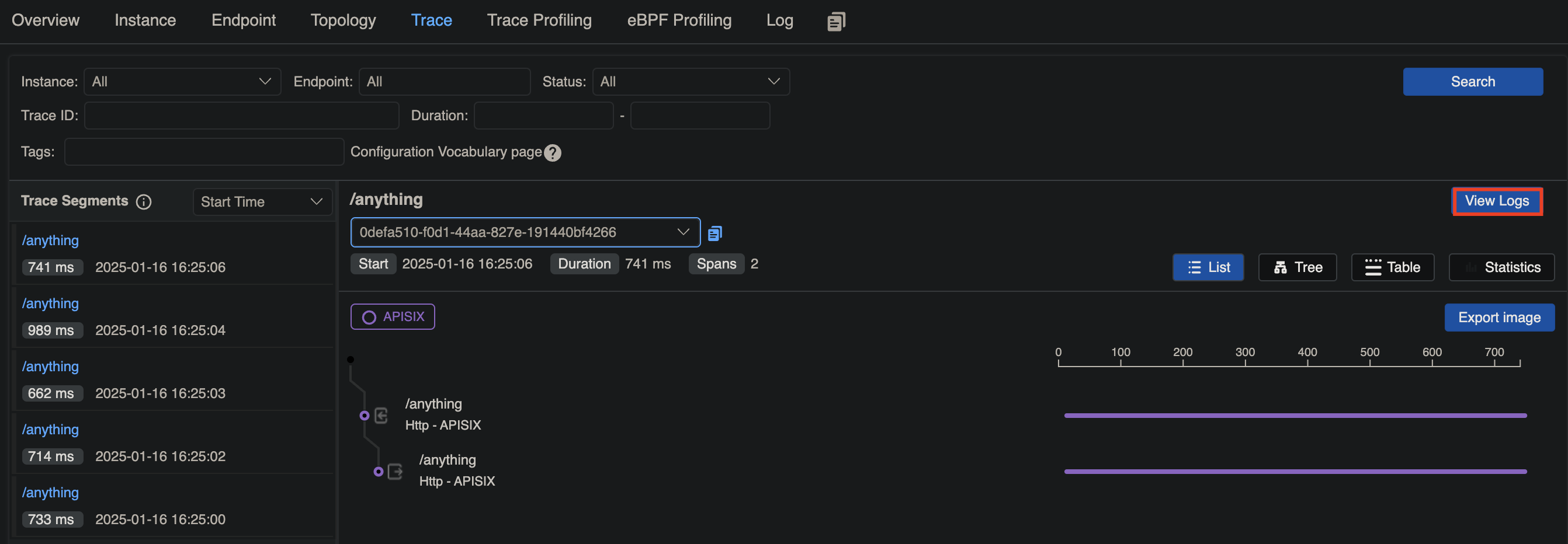skywalking-logger
The skywalking-logger plugin pushes request and response logs as JSON objects to SkyWalking OAP server in batches and supports the customization of log formats.
If there is an existing tracing context, it sets up the trace-log correlation automatically and relies on SkyWalking Cross Process Propagation Headers Protocol.
Examples
The examples below demonstrate how you can configure skywalking-logger plugin for different scenarios.
To follow along the example, start a storage, OAP and Booster UI with Docker Compose, following Skywalking's documentation. Once set up, the OAP server should be listening on 12800 and you should be able to access the UI at http://localhost:8080.
Log Requests in Default Log Format
The following example demonstrates how you can configure the skywalking-logger plugin on a route to log information of requests hitting the route.
Create a route with the skywalking-logger plugin and configure the plugin with your OAP server URI:
curl "http://127.0.0.1:9180/apisix/admin/routes" -X PUT \
-H "X-API-KEY: ${ADMIN_API_KEY}" \
-d '{
"id": "skywalking-logger-route",
"uri": "/anything",
"plugins": {
"skywalking-logger": {
"endpoint_addr": "http://192.168.2.103:12800"
}
},
"upstream": {
"nodes": {
"httpbin.org:80": 1
},
"type": "roundrobin"
}
}'
Send a request to the route:
curl -i "http://127.0.0.1:9080/anything"
You should receive an HTTP/1.1 200 OK response.
In Skywalking UI, navigate to General Service > Services. You should see a service called APISIX with a log entry corresponding to your request:
{
"upstream_latency": 674,
"request": {
"method": "GET",
"headers": {
"user-agent": "curl/8.6.0",
"host": "127.0.0.1:9080",
"accept": "*/*"
},
"url": "http://127.0.0.1:9080/anything",
"size": 85,
"querystring": {},
"uri": "/anything"
},
"client_ip": "192.168.65.1",
"route_id": "skywalking-logger-route",
"start_time": 1736945107345,
"upstream": "3.210.94.60:80",
"server": {
"version": "3.13.0",
"hostname": "7edbcebe8eb3"
},
"service_id": "",
"response": {
"size": 619,
"status": 200,
"headers": {
"content-type": "application/json",
"date": "Thu, 16 Jan 2025 12:45:08 GMT",
"server": "APISIX/3.13.0",
"access-control-allow-origin": "*",
"connection": "close",
"access-control-allow-credentials": "true",
"content-length": "391"
}
},
"latency": 764.9998664856,
"apisix_latency": 90.999866485596
}
Log Request and Response Headers With Plugin Metadata
The following example demonstrates how you can customize log format using plugin metadata and built-in variables to log specific headers from request and response.
In APISIX, plugin metadata is used to configure the common metadata fields of all plugin instances of the same plugin. It is useful when a plugin is enabled across multiple resources and requires a universal update to their metadata fields.
First, create a route with the skywalking-logger plugin and configure the plugin with your OAP server URI:
curl "http://127.0.0.1:9180/apisix/admin/routes" -X PUT \
-H "X-API-KEY: ${ADMIN_API_KEY}" \
-d '{
"id": "skywalking-logger-route",
"uri": "/anything",
"plugins": {
"skywalking-logger": {
"endpoint_addr": "http://192.168.2.103:12800"
}
},
"upstream": {
"nodes": {
"httpbin.org:80": 1
},
"type": "roundrobin"
}
}'
Next, configure the plugin metadata for skywalking-logger:
curl "http://127.0.0.1:9180/apisix/admin/plugin_metadata/skywalking-logger" -X PUT \
-H "X-API-KEY: ${ADMIN_API_KEY}" \
-d '{
"log_format": {
"host": "$host",
"@timestamp": "$time_iso8601",
"client_ip": "$remote_addr",
"env": "$http_env",
"resp_content_type": "$sent_http_Content_Type"
}
}'
❶ log the custom request header env.
❷ log the response header Content-Type.
Send a request to the route with the env header:
curl -i "http://127.0.0.1:9080/anything" -H "env: dev"
You should receive an HTTP/1.1 200 OK response. In Skywalking UI, navigate to General Service > Services. You should see a service called APISIX with a log entry corresponding to your request:
[
{
"route_id": "skywalking-logger-route",
"client_ip": "192.168.65.1",
"@timestamp": "2025-01-16T12:51:53+00:00",
"host": "127.0.0.1",
"env": "dev",
"resp_content_type": "application/json"
}
]
Log Request Bodies Conditionally
The following example demonstrates how you can conditionally log request body.
Create a route with the skywalking-logger plugin as follows:
curl "http://127.0.0.1:9180/apisix/admin/routes" -X PUT \
-H "X-API-KEY: ${ADMIN_API_KEY}" \
-d '{
"id": "skywalking-logger-route",
"uri": "/anything",
"plugins": {
"skywalking-logger": {
"endpoint_addr": "http://192.168.2.103:12800",
"include_req_body": true,
"include_req_body_expr": [["arg_log_body", "==", "yes"]]
}
},
"upstream": {
"nodes": {
"httpbin.org:80": 1
},
"type": "roundrobin"
}
}'
❶ include_req_body: set to true to include request body.
❷ include_req_body_expr: only include request body if the URL query string log_body is yes.
Send a request to the route with a URL query string satisfying the condition:
curl -i "http://127.0.0.1:9080/anything?log_body=yes" -X POST -d '{"env": "dev"}'
You should receive an HTTP/1.1 200 OK response. In Skywalking UI, navigate to General Service > Services. You should see a service called APISIX with a log entry corresponding to your request, with the request body logged:
[
{
"request": {
"url": "http://127.0.0.1:9080/anything?log_body=yes",
"querystring": {
"log_body": "yes"
},
"uri": "/anything?log_body=yes",
...,
"body": "{\"env\": \"dev\"}",
},
...
}
]
Send a request to the route without any URL query string:
curl -i "http://127.0.0.1:9080/anything" -X POST -d '{"env": "dev"}'
You should not observe a log entry without the request body.
If you have customized the log_format in addition to setting include_req_body or include_resp_body to true, the plugin would not include the bodies in the logs.
As a workaround, you may be able to use the NGINX variable $request_body in the log format, such as:
{
"skywalking-logger": {
...,
"log_format": {"body": "$request_body"}
}
}
Associate Traces with Logs
The following example demonstrates how you can configure the skywalking-logger plugin on a route to log information of requests hitting the route.
Create a route with the skywalking-logger plugin and configure the plugin with your OAP server URI:
curl "http://127.0.0.1:9180/apisix/admin/routes" -X PUT \
-H "X-API-KEY: ${ADMIN_API_KEY}" \
-d '{
"id": "skywalking-logger-route",
"uri": "/anything",
"plugins": {
"skywalking": {
"sample_ratio": 1
},
"skywalking-logger": {
"endpoint_addr": "http://192.168.2.103:12800"
}
},
"upstream": {
"nodes": {
"httpbin.org:80": 1
},
"type": "roundrobin"
}
}'
Generate a few requests to the route:
curl -i "http://127.0.0.1:9080/anything"
You should receive HTTP/1.1 200 OK responses.
In Skywalking UI, navigate to General Service > Services. You should see a service called APISIX with a trace corresponding to your request, where you can view the associated logs:

